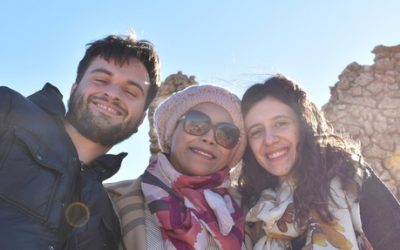International Women’s Day 2023
by SCI India West Bengal State Group
Like other years this year also we observed International Women’s Day on 8th March. We, SCI India, West Bengal Group celebrated International Women’s Day with great enthusiasm.
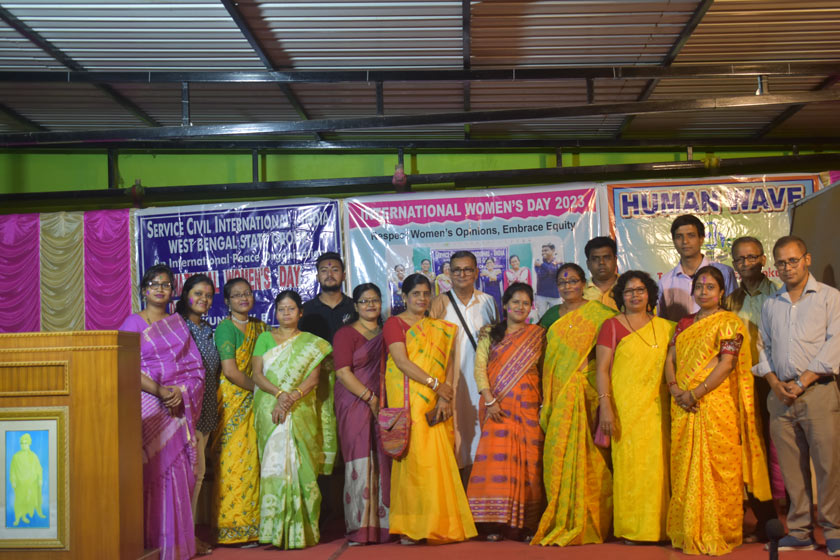
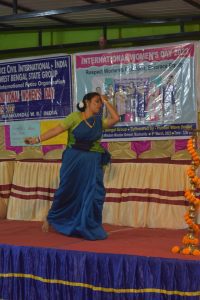
The event was inaugurated with a dance by Mrs. Rani Manna. She staged a dance with a greatly empowering Tagore’s song “Jodi Tore Dak Sune Kau Na Ase Tobe Ekla chalore” The message passed over through this song was “Invite everyone but if nobody joins you, then go forward alone, Hey unfortunate lady, if everybody turn you down because of fear and look at your face then articulate your thought alone, if nobody pays attention to you, if your feet bleeds while walking on the throng, go ahead alone, if the lamp of hut is put out by the thunderstorm, let the lamp glow in your heart and go ahead.
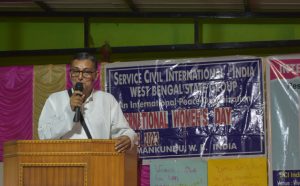 After the dance a welcome speech was delivered by Tapas Sur, the West Bengal State group secretary, with a brief introduction of patriarchal value system that’s prevailing in our society and how we celebrate the red letter days and forget our promises made on these occasions. He also requested the audience to join us on this cause.
After the dance a welcome speech was delivered by Tapas Sur, the West Bengal State group secretary, with a brief introduction of patriarchal value system that’s prevailing in our society and how we celebrate the red letter days and forget our promises made on these occasions. He also requested the audience to join us on this cause.
He requested our chief guest Mrs. Swapna Chaidhuri, a renowned educationist, to inaugurate the program by lighting the lamp. The other guest speakers of the event joined her.
The guests were felicitated with a Badge, a Sash and a Memento.
Mrs. Swapna Chaudhuri , educationist was felicitated by Mr. Bikash Chal, president of SCI I state group
Mr. Sumanta Biswas , social worker, was felicitated by Adv. M.Bhattacharjee, member SCI State group
Mrs. Nasrin Layla, Woman activist was felicitated by Mrs. Chanda Das, member SCI State group.
Mrs. Chitralekha Das, Advocate was felicitated by Mrs. Ruma Mondal, member SCI State group
Mrs. Haimanti Das, cultural activist was felicitated by Mrs. Shymashree Adhikary, member SCI State group
This year time five special guests took part and spoke about the position of the women and their participation in social fields.
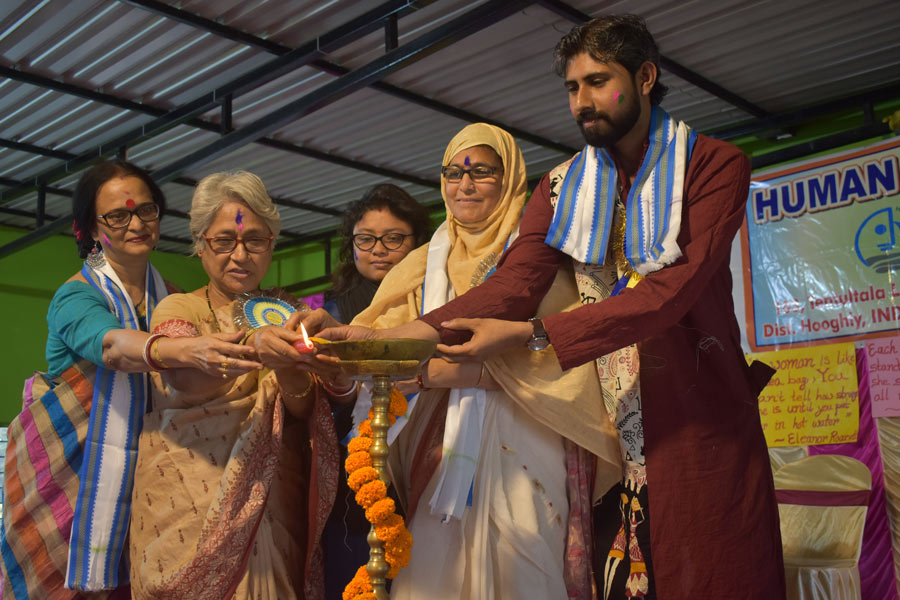
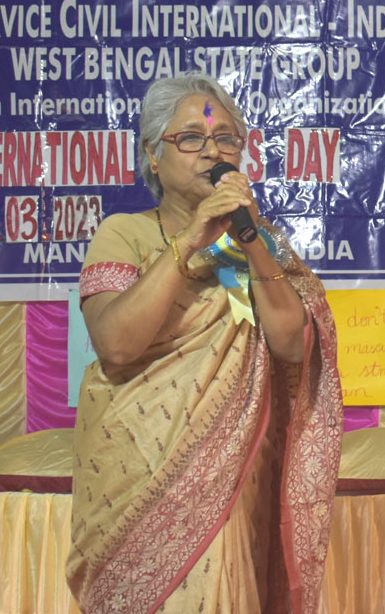 Then Mrs. Swapna Chaudhuri , our chief guest spoke about the back ground history of Women’s day. She introduced Clara Zetkin and her activities. She also narrated how she initially faced problems to start her career and had to change her jobs several times. She encouraged the women to create their own identities and not to be known by their husband’s or son’s identities. She advised the women not to always please others but also to look for their own happiness. After that Adv. Chitralekha Das spoke regarding the Women’s Day. She said not only on International Women’s Day or on National Women’s day on 13th. February but women should be treated with due honor throughout the year. She said, in Indian mythology we see the Goddess are more powerful than the Gods. The Goddess killed the demons several times. We also see several Indian women in modern history of India how did they fought against the British to make India free in this regards she spoke about Jhansi ki Rani Lakhibai who put up a great resistance against the British.
Then Mrs. Swapna Chaudhuri , our chief guest spoke about the back ground history of Women’s day. She introduced Clara Zetkin and her activities. She also narrated how she initially faced problems to start her career and had to change her jobs several times. She encouraged the women to create their own identities and not to be known by their husband’s or son’s identities. She advised the women not to always please others but also to look for their own happiness. After that Adv. Chitralekha Das spoke regarding the Women’s Day. She said not only on International Women’s Day or on National Women’s day on 13th. February but women should be treated with due honor throughout the year. She said, in Indian mythology we see the Goddess are more powerful than the Gods. The Goddess killed the demons several times. We also see several Indian women in modern history of India how did they fought against the British to make India free in this regards she spoke about Jhansi ki Rani Lakhibai who put up a great resistance against the British.
She also spoke about several women who joined Gandhi ji’s non-violence movement or took up arms to make India free. She spoke about the first Indian woman doctor Kadambini Bose Ganguly who was born on 18 July 1861. Ganguly was the first woman to gain admission to Calcutta Medical College in 1884, subsequently trained in Scotland, and established a successful medical practice in India. She was the first woman speaker in the Indian National Congress. Her father and Abhay Charan Mallick started the movement for women’s emancipation at Bhagalpur, establishing the women’s organisation Bhagalpur Mahila Samiti in 1863, the first in India. Adv. Chitralekha also cited many Bengali revolutionary like Matangini Hazra and Pritilata Waddedar etc. She mentioned that in this present time also the mental stigma of the mate dominated society sabotages women freedom, she being a lawyer she also faces the harassment. Though Indian Constitution has the provisions of Equality under Article 14, 15(1), 16, 21, 39(d) and 42 but still women are harassed at her work place, here she mentioned the famous case “Vishaka Vs State of Rajasthan case. The decision of the Supreme Court in Vishakha v State of Rajasthan was a landmark one as it laid down elaborate guidelines to deal with the menace of sexual harassment against women at workplaces. She said that the women’s participation is increasing in the field of education and economy and this is empowering the women to take their own decisions, hence divorce is increasing in Indian society rapidly. She concluded her speech with a poem of Tagore.
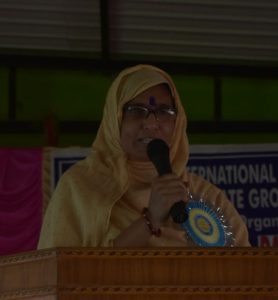 She was followed by Mrs. Nasrin Layla, a noted entrepreneur who started as a Self Help Group leader of 10 women and she now leads a 2500 women. She has floated a company named Sonar Modina Farmers Products Company Limited, Her company started agricultural farming, Pisciculture, Goat rearing and also different kind of spices. Nasrin Laya described her journey from Zero to her present position of successful entrepreneurship. She gave a beautiful speech about the struggle of her life. How she became in contact with the official of different Govt. departments, took trainings with her group members, how she promoted the team spirit among the team members to work together.She was a very simple lady who has become guide and inspiration for many women and helped them to stand on their own feet. The audience applauded her story of success. Mrs. Haimanti Das said Women’s Day is celebrated to eliminate gender discrimination and demand equality in art, literature and society. She recited poems of Sushmita Bhattacharya and Krishna Bose. She concluded her speech by saying that International Women’s Day is dedicated to celebrating the achievements of Women in social, cultural, and political fields. The Day helps in bringing attention towards the forgotten Women’s rights and gender parity in some places around the world. It should be considered a Day where everyone acknowledges the values and the importance of Women in our lives and all around the world.
She was followed by Mrs. Nasrin Layla, a noted entrepreneur who started as a Self Help Group leader of 10 women and she now leads a 2500 women. She has floated a company named Sonar Modina Farmers Products Company Limited, Her company started agricultural farming, Pisciculture, Goat rearing and also different kind of spices. Nasrin Laya described her journey from Zero to her present position of successful entrepreneurship. She gave a beautiful speech about the struggle of her life. How she became in contact with the official of different Govt. departments, took trainings with her group members, how she promoted the team spirit among the team members to work together.She was a very simple lady who has become guide and inspiration for many women and helped them to stand on their own feet. The audience applauded her story of success. Mrs. Haimanti Das said Women’s Day is celebrated to eliminate gender discrimination and demand equality in art, literature and society. She recited poems of Sushmita Bhattacharya and Krishna Bose. She concluded her speech by saying that International Women’s Day is dedicated to celebrating the achievements of Women in social, cultural, and political fields. The Day helps in bringing attention towards the forgotten Women’s rights and gender parity in some places around the world. It should be considered a Day where everyone acknowledges the values and the importance of Women in our lives and all around the world.
Mr. Sumanta Biswas who did a commendable job in the remote villages introducing sanitary napkins, raising awareness among the rural people discussed about the issue.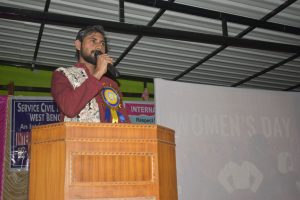 He said the hygiene pads be given at subsidized rates to protect rural women from diseases that may arise for not taking menstrual care. Taking time off his schedule, he has been campaigning on the need for using sanitary napkins to make rural women health conscious. He made an appeal to the Chief Minister and the Child and Women Protection Department of the central Govt to provide sanitary napkin. He also said that Napkin Machines have been installed in various schools. He presented his speech through a PowerPoint presentation giving us a detailed audio-visual view.
He said the hygiene pads be given at subsidized rates to protect rural women from diseases that may arise for not taking menstrual care. Taking time off his schedule, he has been campaigning on the need for using sanitary napkins to make rural women health conscious. He made an appeal to the Chief Minister and the Child and Women Protection Department of the central Govt to provide sanitary napkin. He also said that Napkin Machines have been installed in various schools. He presented his speech through a PowerPoint presentation giving us a detailed audio-visual view.
On this day we released the Third Edition of ‘Bataboron’.
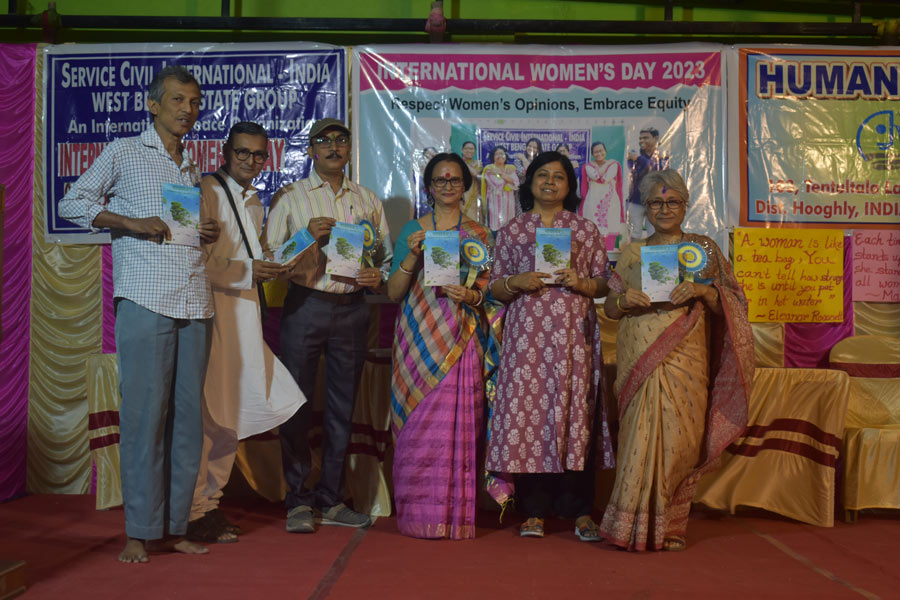
Mrs. Somapti Mukherjee, who was the anchor of the event was felicitated by the secretary of the SCI State group with Sash and Memento.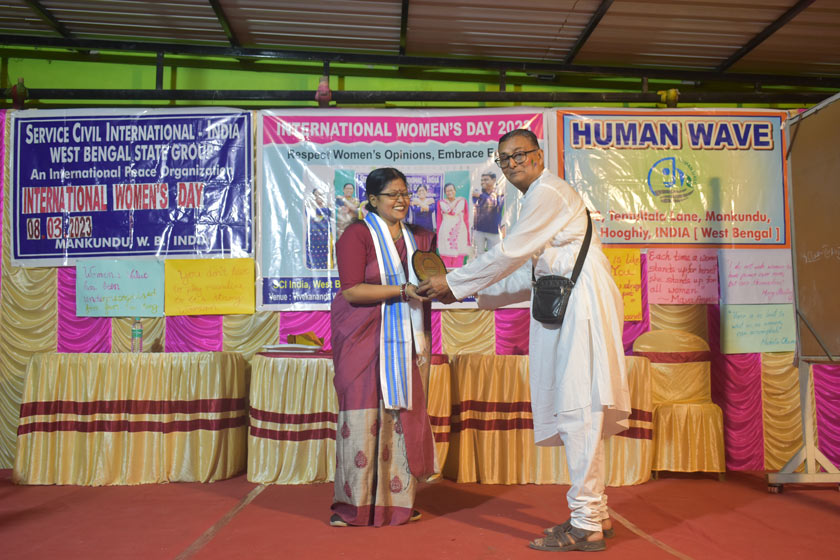
Mrs. Samapti Mukherjee read out this message of Prof. Kishore Mukherjee for the audience.
Respected organizer of the seminar “International Women’s Day”, Guest on the dais and all and Sundry thronged in the auditorium – I feel parsimonious in reiterating the history of selecting 8th. March every year as international Women’s Day”. Rather I must focus attention on the history that the first women’s movement was organized and ushered in an American thread factory on the 8th March 1857, bargaining for getting social security privileges – It comprised of wiping out male – female wage differential, working hours minimization and creation of favorable working environment in factory premises. This demand is an economic demand in nature. Later on in the year 1975 UNO observed and declared 8th March “International Women Day”. Since then the 8th. March has been observed as “International Women’s Day” every year. However, now-a days in the broad sense Women’s Day refers to emancipation of women or freedom of women from the traditional concept of gender inequality or gender discrimination in every sphere of life, namely, Economic, Political, Social and Religious grounds. The utmost necessity of women’s freedom arises, as Noble Laureate Dr. Amarta Sen, pointed out, to attain Self Sustained Economic Development the women should come forward in large scale to participate in the development programme. The potentiality to achieve this norm (that is large scale women’s participation) requires the degree of prevalence of the following three criteria – particularly in developing countries: 1. Entitlement, 2. Freedom of Choice, 3. Empowerment
ENTITLEMENT – In third world countries the prevalence of severe gender discrimination is still alarming. It persists in most of the families whether literate or illiterate (both in villages and towns). As an example of gender discrimination we find that new born male and female babies do not receive equal treatment of equals. Male child is preferred to the female child and as a result male child is cared for while the female child is neglected. Negligence is found in their food, dressing, etc. As they grow older male children get various opportunities while female children are deprived. Malnutrition, depression, weaken the latter’s physical as well as mental growth. In Joint Families female members are exploited from their birth till death. Marriage during their childhood leads to a high infant mortality rate. Mothers as well as their children suffer terribly from malnutrition, non availability of required medical facilities etc. This is found both in villages and also in slum dwelling areas. So far as working women are concerned they are protected to some extent by the enactment of the Maternity Act. This Act makes provision for providing adequate rest and financial assistance before and during confinement. Leave with pay is also granted after delivery for a few months. Now-a-days the governments in the Third World Countries have come forward to eradicate malnutrition problem as well as health hazard matters by providing mid-day meals and founding rural hospitals in remote rural areas as well as modernized divisional hospitals, Medical Colleges in cities.
FREEDOM OF CHOICE : Economic , Political , Social and Religious freedom of women fall under the purview of freedom of choice. This is undoubtedly a very crucial weapon for accelerating the speed of female emancipation from gender discrimination or gender inequality. Breaking the traditional views in favour of existing gender inequality, now women seek economic self sufficiency by engaging themselves in non-traditional jobs as per their ability and preference. This is a concrete example of economic freedom of choice. Women’s own decision whether to marry or not or when to marry being adult is an example of social freedom of choice. Here decision is not imposed by others. Their political freedom of choice is ensured when they are self empowered to cast their voting right according to their individual decision, their opportunity to contest in Assembly or Parliament elections as representative of the people. Now-a-days reservation of seats for females in Parliament, Assembly and Panchayet (village administration) elections stands at 33% in India. Their religious freedom refers to their rights to accept and preach religion as per their vagaries.
EMPOWERMENT : In a nutshell , it refers to women’s freedom to absorb themselves in any sector ( Primary , Secondary and Tertiary ) as per their education and working skill and qualification. Traditional view of employing only men workers in various corporate sectors as well as government administrative jobs ( IAS , IPS ) is now discarded and at present women’s domain in this respect has been enlarged. To raise women’s participation in the engineering field and entrepreneurial activities Governments are taking resort to various programmes. They deserve their right to be honored everywhere. In conclusion, I must point out that India’s social structure is just like a Pyramid. The upper zone of the Pyramid comprises of people belonging to the high income Strata where women enjoy more or less all sorts of freedom of choice to an enormous extent while middle and bottom of the pyramid comprises of persons belonging to low and middle income groups to whom these sorts of independence are nothing but reveries. They are deprived of their rights severely. The extent of deprivation can be minimized by Govt. intervention on a large scale in collaboration with the support of social forums in this regard.
I congratulate SCI India, West Bengal group for organizing such a wonderful seminar and yearn for successes in its every endeavor in future.
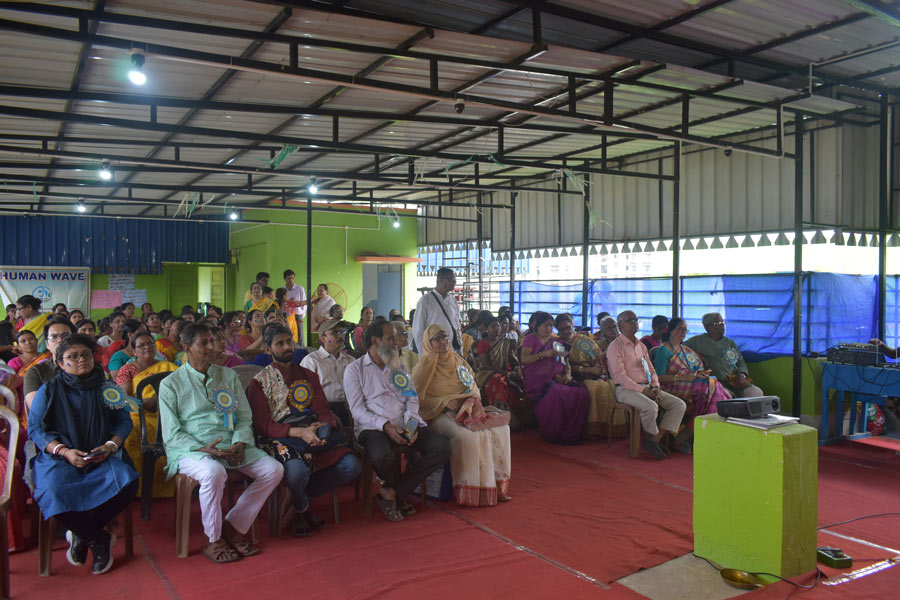 SCI India, West Bengal Group members and volunteers
SCI India, West Bengal Group members and volunteers
Explore more news
Youth eco-volunteering in a Euro-Mediterranean context: challenges and opportunities
We reached the culmination of our Youth Green Deal project, funded by Erasmus+. It was time to bring our community together and share our remarkable journey and insights with a wider audience. The "Youth eco-volunteering in a Euro-Mediterranean context: challenges and opportunities" conference took place from June 14 to 17, 2023, in Tunis, Tunisia. This conference presented a significant...
Call for Participants: Environmental Activism through Civic Engagement for Nature
Join the SCI Climate Team and become part of a passionate group of volunteers dedicated to environmental activism and climate justice. A training course called "PEACE for Nature" is being held to empower young individuals to become effective climate activists and advocates. PEACE for Nature Training Course: What will you learn? Advocate for equitable solutions and understand the principles of...
Call for participants: “From Conflict to Collaboration: Building a Culture of Peace in Diverse Communities”
The “Peace in Diversity” project develops conflict resolution skills in youth leaders, equips professionals and volunteers with tools for peacebuilding in daily lives, enhances partner organisations’ capacity as peace promoters, and takes co-responsibility for the peaceful future of Europe. In particular, we aim to: demonstrate to the young people that peace starts with how we treat our...

